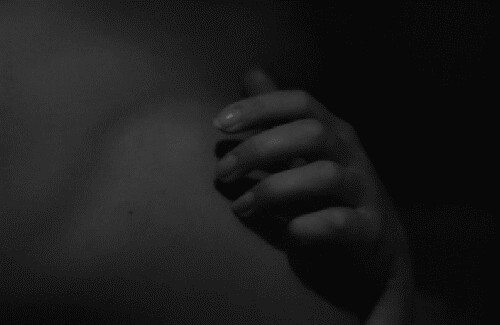Affection.
Bleak, moody and scarred, "Hiroshima Mon Amour" is a film of uncommon power that treads both the emotional trauma of love and the ravages of war. Amid post-war Hiroshima, the film has maintained a deeply soulful dialogue between two lost people desperately trying to feel, to fall in love overnight, and to understand. But this isn't "Before Sunrise" here.
"Hiroshima Mon Amour" is just one of those legendary films whose allure can never be easily diminished. Yes, it is a truly impressive exercise in innovative filmmaking technique (it is the film that has deeply influenced the French New Wave), but buried deep within all its picturesque framings and compositions is a beating heart and a crying soul.
With a quietly affectionate screenplay written by Marguerite Duras that contains stream of consciousness dialogues that’s as romantically longing as they are emotionally detached, "Hiroshima Mon Amour" conveys its power through its two main characters' internal articulacy. They speak in a manner that transcends the limitations of the tongue. They speak as if their feelings overlap their vocabularies. They converse as if they see through each other's hearts. A French actress (Emmanuelle Riva) and a Japanese architect (Eiji Okada): the two of them represent the confusion we call love and the despairing post-romantic reality we call pain. They both know that they want each other but they just can't admit it to themselves.
In the film's early scenes, we see how happy the French actress is when she's with the architect (shot in effective close-ups). But slowly and effectively, director Alain Resnais was able to construct her ironically fractured past by way of fragmentary flashbacks in Nevers, France that's as dream-like as the cityscapes of post-war Hiroshima. Sporting a haircut like that of Maria Falconetti in "The Passion of Joan of Arc" in the past, the French actress, just like the aforementioned saint, is a martyr, but not in the context of religion but of love.
Resnais has highlighted the fact that, like all women, the French actress just wants to feel love more than anything else but is deeply scarred to try yet again. She consummates the meager sexual pleasures with the architect but she's too afraid to go beyond that. She wants to feel once more. She wants to erase the past, forget and fall in love again but just can't because she knows that she won't be ready yet.
There's this powerful scene in the film where the actress is telling the architect the story of how she once loved a German soldier back in Nevers, France when suddenly, the architect seems to take on the identity of the deceased German lover as he identifies more and more with the story. The actress, on the other hand, lost in her own romantic recollection, unconsciously talks back to the architect as if she's talking to the German himself. Despite of her new-found connection with the Japanese gentleman, she still struggles to see herself together with other men other than her tragic lover. She's a captive of her own painful memories.
With a slightly upbeat musical score that seems to mock the utter desperation in the French actress and the Japanese architect's happenstance romance, "Hiroshima Mon Amour" is a film that does not scoff at the idea of love outside marriage but instead seems to mourn the idea as to why should this limitation exist. Although that's just a mere observation from yours truly, I just can't help but feel that aside from the French actress' inescapably scarred past, what may also be holding them back is the simple fact that they are both married.
There's this scene in the film where both of them, standing quietly across each other in a living room, straightforwardly expressed their utmost admiration for their respective husband and wife. Sure, for some reasons explainable only by the heart, they want to be with each other, but they are also aware of the fact that their marriages are too good to be on the losing end of their intended romantic transgression.
In another key scene, notice how the architect is chasing the actress through the streets of Hiroshima yet the latter keeps on moving and the former, uncharacteristic for a person who wants to catch up with someone, merely preferred to trail her. They want to hold each other yet they also want distance and space. "You're destroying me. You're good for me," the actress told the architect while they are presumably making love in the earlier moments of the film; there's the paradox of their romance right there.
"Hiroshima Mon Amour", aside from being a landmark film that has launched an entire cinematic movement, is an unforgettable love story not of two people but of two longing souls who, because of circumstances, just can't be together. "You saw nothing in Hiroshima," the Japanese architect said to the actress in the film's early scenes. Maybe that's what they need to believe in to properly move on.
FINAL RATING




No comments:
Post a Comment